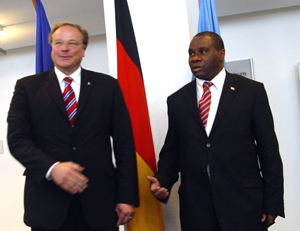
Issues discussed by the two ministers include how to strengthen state institutions in Burundi to make them more efficient. Protection of human rights also featured in the discussion.
Minister Niebel, whose concern and dedication to the development of Africa needs to be commended, observed that the consequences of the ten-year civil war in Burundi were still being felt and stressed the need for the intensification of dialogue between government and opposition as well as intra-societal reconciliation, as well as the “honest re-appraisal of the events” of the civil war.
Within the context of development co-operation between the two countries, Germany will also play a role in the decentralization of the health sector in addition to its involvement in water supply and sanitation programmes.
In furtherance of these programmes of assistance, Germany committed an additional funding of 27.5 million euros for two years during Minister Niebel’s trip to Burundi in December 2011.
Minister Niebel stressed the importance and commitment Germany attaches to efficient functioning of government structures at grass-roots levels, adding that investments in the institutions of self-government as well as in basic services such as water and the health sector helps in no small measure in preventing conflicts.
Furthermore, Minister Niebel stressed Germany continued support to Burundi in its efforts to stabilize the security situation as well as create avenues for positive development.
Burundi is one of the smallest and poorest countries on the African continent with a very high population density as well as a high population growth.
Development Co-operation
Germany’s development cooperation focuses on the issues of water supply, water management and sanitation. In the medium term, the ongoing measures to ensure peace and reintegrate refugees and ex-combatants will continue, as will reproductive health policies and efforts to combat HIV/AIDS. The first phase of development cooperation was designed to support the country’s political renewal by rapidly implementing such measures, thus providing tangible evidence of a peace dividend. Measures to reintegrate returning refugees have since been greatly expanded. 2008 saw the launch of a new project to support Burundi’s police force in its efforts to improve public security in the country. German development cooperation has been continually increased, to approximately EUR 27.5 million in 2011, the water sector being the main priority. German support for the country’s notoriously inadequate energy sector is, however, also an important element in efforts to promote sustainable development.
Germany is also the country’s biggest donor of family planning funds.
A. Musah, ANA Political Editor
